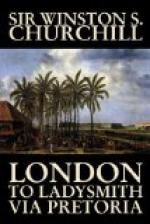CHAPTER X
IN AFRIKANDER BONDS
Pretoria: December 3rd, 1899.
It was, as nearly as I can remember, midday when the train-load of prisoners reached Pretoria. We pulled up in a sort of siding with an earth platform on the right side which opened into the streets of the town. The day was fine, and the sun shone brightly. There was a considerable crowd of people to receive us; ugly women with bright parasols, loafers and ragamuffins, fat burghers too heavy to ride at the front, and a long line of untidy, white-helmeted policemen—’zarps’ as they were called—who looked like broken-down constabulary. Someone opened—unlocked, that is, the point—the door of the railway carriage and told us to come out; and out we came—a very ragged and tattered group of officers—and waited under the sun blaze and the gloating of many eyes. About a dozen cameras were clicking busily, establishing an imperishable record of our shame. Then they loosed the men and bade them form in rank. The soldiers came out of the dark vans, in which they had been confined, with some eagerness, and began at once to chirp and joke, which seemed to me most ill-timed good humour. We waited altogether for about twenty minutes. Now for the first time since my capture I hated the enemy. The simple, valiant burghers at the front, fighting bravely as they had been told ‘for their farms,’ claimed respect, if not sympathy. But here in Pretoria all was petty and contemptible. Slimy, sleek officials of all nationalities—the red-faced, snub-nosed Hollander, the oily Portuguese half-caste—thrust or wormed their way through the crowd to look. I seemed to smell corruption in the air. Here were the creatures who had fattened on the spoils. There in the field were the heroes who won them. Tammany Hall was defended by the Ironsides.
From these reflections I was recalled by a hand on my shoulder. A lanky, unshaven police sergeant grasped my arm. ’You are not an officer,’ he said; ‘you go this way with the common soldiers,’ and he led me across the open space to where the men were formed in a column of fours. The crowd grinned: the cameras clicked again. I fell in with the soldiers and seized the opportunity to tell them not to laugh or smile, but to appear serious men who cared for the cause they fought for; and when I saw how readily they took the hint, and what influence I possessed with them, it seemed to me that perhaps with two thousand prisoners something some day might be done. But presently a superior official—superior in rank alone, for in other respects he looked a miserable creature—came up and led me back to the officers. At last, when the crowd had thoroughly satisfied their patriotic curiosity, we were marched off; the soldiers to the enclosed camp on the racecourse, the officers to the States Model Schools prison.




